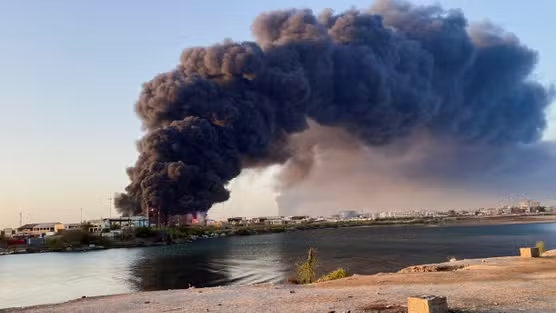While the civil war ravaging Sudan for over two years stems from a rivalry between two men, it is being fueled by regional influences. As the risk of partition grows, it is becoming essential to exert pressure on external players, led by the United Arab Emirates, to find a resolution.
Repeated drone attacks striking Port Sudan since early May serve as a reminder that the civil war tormenting the country, now in its third year since April, remains as devastating as ever. The numbers reflect the extent of this often-overlooked conflict: over 150,000 dead and more than 13 million people displaced by the fighting.
Until now, Port Sudan had been spared and served not only as the capital of the de facto government, which relocated there when Khartoum became a battleground, but also as a crucial entry point for aid in a country beset by a humanitarian crisis. This crisis prompted United Nations Secretary General António Guterres to describe Sudan as trapped in a “nightmare of violence, hunger, disease and displacement.” The destruction of essential infrastructure by these drone attacks, including one on the country’s last operational civilian airport, will only complicate the delivery of aid.
Contrary to what seemed a plausible scenario at the end of March – when the Sudanese Armed Forces (SAF) led by General Abdel Fattah al-Burhan regained control of Khartoum after being ousted by the Rapid Support Forces (RSF), paramilitaries led by his rival General Mohammed Hamdan Dagalo, known as “Hemedti,” his former deputy – this reconquest did not lead to a turning point in the war. The conflict erupted nearly six months after the October 2021 military coup, which ended the promising democratic experiment born from the overthrow of Omar al-Bashir.
The RSF – strong in the south and west, particularly in Darfur, where they are committing numerous massacres – have instead demonstrated in Port Sudan that their firepower remains intact. The paramilitaries seized the opportunity of the second anniversary of the conflict’s onset on April 15 to announce the formation of their own government. This has heightened the risk of a partition of Sudan with incalculable regional consequences, as both sides, guilty of numerous abuses against civilians, are increasingly resorting to militias, fueling threats of fragmentation of the country.

Warmongers by proxy
The Sudanese tragedy originates from the rivalry between two men, but it is exacerbated by regional influences. The United Nations condemned in April the fact that “weapons and fighters continue to flow into Sudan,” allowing the conflict to “persist and spread.” Drone attacks on Port Sudan have led to the severance of diplomatic relations between the de facto authorities of the country and the United Arab Emirates, accused, despite their denials, of supplying the paramilitaries with sophisticated weaponry.
Pulling Sudan out of a spiral in which it could lose itself means first and foremost putting pressure on these external players, who are instigating war and massacres by proxy. The United States holds undeniable leverage to achieve this, given its relations with the countries indirectly engaged in the Sudanese civil war, which, besides the United Arab Emirates, include Egypt and especially Saudi Arabia, aligned with General al-Burhan. It remains to be seen whether Donald Trump, visiting the Arabian Peninsula from Tuesday, May 13, understands that his country, like all others, has an interest in silencing the weapons in Sudan.

